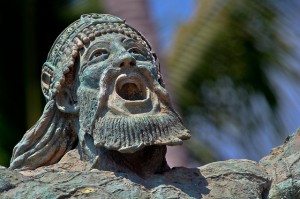” . . . memory played quite a different role in oral culture from what it played in literate culture.” (Ong [*])
Poetry in oral cultures does not rely on exact verbatim repetition. The oral poet has deep familiarily with the poem, and a repertoire of formulas that he can use in various circumstances, to fit in the metrical pattern of the poem. A particular choice is made at the time of performance, and the resulting poem is different each time. (Ong [*])
Primary oral cultures make thoughts memorable by expressing them “in heavily rhythmic, balanced patterns, in repetitions or antitheses, in alliterations and assonances, in epithetic and other formulary expressions, in standard thematic settings . . . , in proverbs . . . which themselves are patterned for retention and ready recall”. (Ong [*]) In oral texts, lists are situated in narratives, such as the catalogue of ships in the Iliad. Thought, like speech, is ephemeral and these memory aids seek to capture fleeting memories.
“The oral song (or other narrative) is the result of interaction between the singer, the present audience, and the singer’s memories of songs sung.” (Ong [*])
